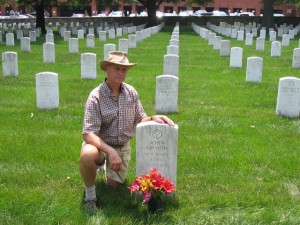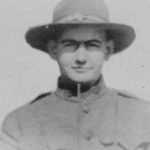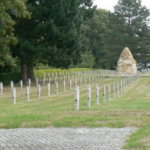By Richard Ammon
GlobalGayz.com
February 13, 2011
And so time passes from immediate knowing to remembering to gentle memorials to vague history. The holocaust that was World War I is now only a distant glimpse of a time ago as the last surviving veteran of that armageddon has finally die d, at the age of 110 in England; her named was Florence Green.
d, at the age of 110 in England; her named was Florence Green.
She was a mess stewart with the WRAF in Marham and Narborough townships in central and eastern England in the closing weeks of the war. The world’s last known veteran of actual combat in World War I was also a Brit, Claude Choules, who died in Australia in May 2011 aged 110. Florence’s funeral will be this week in Norfolk, UK.
My granduncle, Private John Ammon (1888-1918) in that same war, would have been 124 this year, a few years older than these other two veterans. They lived to tell their stories, probably many times over; John did not. On a ravaged rolling hill in the tiny village of St. Georges in eastern France he was cut down by an artillery shell that landed too close for him to escape as his unit was retreating from heavy German counter attack.
He fell a few hundred yards from the village’s cemetery, which can still be seen today. The ground in and around the cemetery was torn and shredded then but three or four memorials still stand from that time, although it’s hard to tell for sure since the etched dates are almost eroded.
It is very peaceful there now. The only sounds are distant cows mooing and the wind in the cedar trees. The rolling terrain is smoothed over pastureland, a thin mask of verdant green over the blood, mud, craters, shattered trees, pain, terror and dead bodies that lay there after the assault.
For some of us connected to the horror of that place and time, the quietude is discernibly anguished. Grief recalled now, over distance and time, does not cut so deeply as it did for Uncle John’s family who only learned of his death–on October 16, 1918–weeks later when his brother (my grandfather) and sister received the telegram from the Red Cross.
Like Red Beach in Leyte, Philippines, where thousands of American soldiers were slain in recapturing that country in World War II, the beach and grassy memorial area today are silent except for the whispering in the trees and the lapping of the waves–as in Normandy, Omaha Beach, Batan and hundreds of other places where atrocious inhumanity reigned for a while.
One wants to cry out at such places on behalf of the ‘little guys’ from farms and cities in far off hometowns whose guts were spilled and wasted by the political madness of the ‘big guys’ whose arrogant greed for power steamrolled over anonymous millions–anonymous except for those of us who connect to the fallen.
The beautiful cemeteries in Europe and America and Asia are manicured and tidy, with a palpable reverence in the air. There too the wind threads through the trees. There really is no tribute the living can make to the unfairly killed, the youth unfairly killed.
I recently (May 2011) visited uncle John’s grave (photo above), the only family member to do so since his burial in Arlington National Cemetery on October 6, 1921. It was peaceful.
















